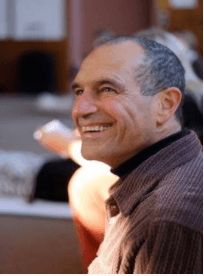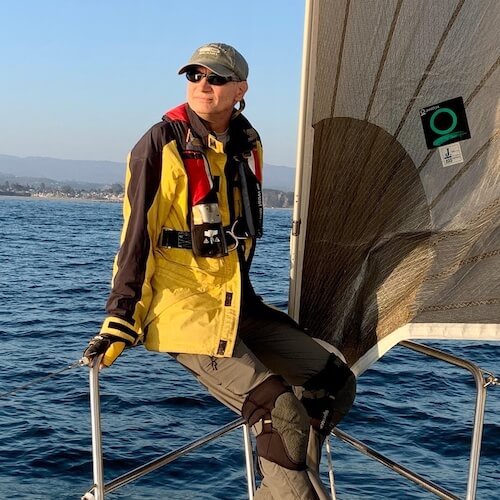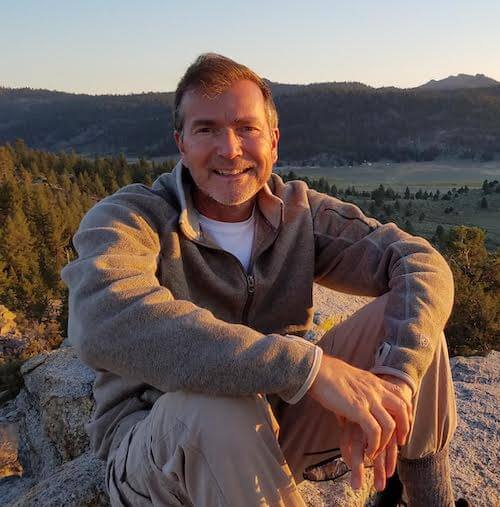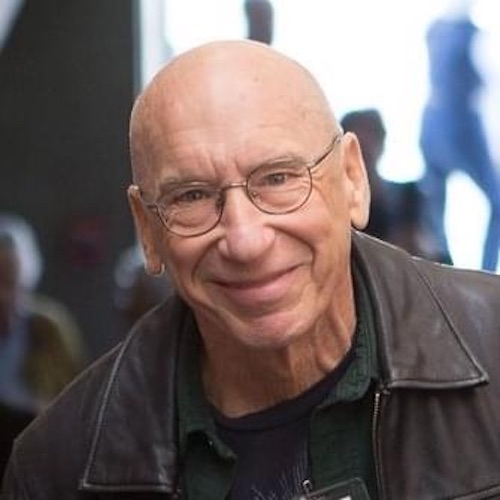"For those of us who have been practicing awareness, we have been preparing for moments like this. We can be a source of light, clarity and helpful ideas for others, as well as ourselves. For those new to these ideas and practices, it is in your capacity to quickly grow realistic, intelligent, life-giving responses to the uncertainty of life. We are all in this together."

Russell Delman has dedicated his life to the study of human transformation and is deeply indebted to his more than 40 years of both Zen meditation and marriage. He has helped train more than 2,500 Feldenkrais® practitioners, founded The Embodied Life School and leads The Embodied Life™: Meditation, Guided Inquiry and the Teachings of Moshe Feldenkrais September 25-27 at Esalen with his wife, Linda.
A longtime part of the Esalen faculty, Russell also holds the Esalen community dear to his heart and as the impact of COVID-19 (the coronavirus) affects us globally, Esalen News reached out to Russell for his insights on best practices during times of uncertainty, which he shares below:
We are part of an intricate, complex, fantastically interconnected web of life. We are designed to be in harmony with life. The creative wisdom of our bodies has learned, and continues to learn, to deal with the dangers presented in our environment.
This is our collective, adaptive brilliance. While we can celebrate this truly amazing and wise capacity, sometimes the changes in the outer world occur more quickly than our ability to adapt. At times like these, we must individually and collectively do all that we can to bolster the healthy responses of our individual and collective immune systems.
Chronic fear and mass hysteria are damaging to our health. Denial of authentic local and international dangers is not wise. There are actually two, interacting viruses here—COVID-19 and CHRONIC FEAR VIRUS-XX! What to do? How do we deal effectively with long-term uncertainty and how can self-reflective awareness, along with embodied practices, assist us?
I will not review in detail the common, healthy knowledge that you likely know: wash hands often and completely; get good sleep; avoid handshaking and hugging (but don’t distance yourself emotionally from those around you); eat lots of fruits and vegetables; laugh as much as possible, etc. Rather, let’s focus on the less obvious but equally important behaviors.
Helpful Antidotes and Reliable Practices
Pausing
Place pausing at the top of the list. The more recently evolved functions in our brains need a bit of time to come online and counter the faster, older mechanisms. Pausing from fearful thoughts and anxious images is essential. Pausing is the key to returning to the present moment. Only in presence can we question our reaction patterns. The good news is that we do not need to fight the fearful thoughts or eliminate them. Simply interrupting them changes the inner environment. To repeat: pausing gives the needed seconds for the reflective parts of the brain to do their magic. Note several key ways to pause below:
Saying “Hello in There”
Awareness creates a gap between the panic pattern and the “aware Self.” In this gap you can say to the fearful place inside, “Hello in there, I am with you.” As odd as this may sound, it is remarkably effective. It is like the parental part of your brain caring for the frightened child. Often it helps to place a hand on the place in your body, often the chest or abdomen, where you feel the fear most strongly. Try it.
Grounding
In The Embodied Life teachings, this is the starting point. To step out of thought/feeling patterns, our brains need a tangible alternative. Few things are more solid in our experience than the weight of our physical body and its contact with the environment. Bringing attention to the contact with your chair while sitting and the ground while standing, as well as your sense of weightedness, will “ground” you in the present moment.
Breathing
All fear patterns affect our breathing, either through breath-holding or accelerated breathing. Both of these patterns support and maintain anxiety. Amongst our various breathing practices, two of the most effective and reliable are: three complete breaths and four phase breathing.
With three complete breaths, you pause and give your whole attention to three breaths, sensing from beginning to end. Simple and powerful. Even if your mind wanders, let the thoughts be in the background. You might count each exhale to keep you focused. Try this now.
With four-phase breathing, you simply create a clear, though brief, pause between breaths. In addition to inhaling and exhaling, you now stay present for a brief gap between them. Again, counting each phase softly can allow your mind to stay focused. Perhaps take a moment to experiment with this option.
Taking A Break From Screens
Through the visual cortex, our eyes have a strong influence on our inner state. Consistently refreshing ourselves by placing the palms over the eyes and gazing softly, with closed eyes, into the darkest parts of the visual field is very helpful. Doing this for one minute each hour is a good amount of time to allow your nervous system to enter a restful state. Calming the visual cortex has far reaching effects.
Nature
Even brief moments of connecting to the natural world are surprisingly beneficial for changing the set point of the nervous system. Looking out a window, gazing at a tree, standing on grass, spending undistracted time with a plant or animal and any other way you have of reviving your connection to the natural world can be restorative. This can literally change your neurochemistry in life-giving ways. Even in cities, there are opportunities for moments of refreshment with nature. We do not need a vacation, a full day off or even an hour to receive these gifts.
Taking Responsibility For Our State
Amazingly, through the power of our attention, we have influence over the state of our nervous systems. We cannot eliminate danger, but we can learn to live with it more effectively. Don’t worry if the difficult states return, continue to use the antidotes and keep bringing your care to the frightened inner places and the unhelpful thoughts.
To me the most important thing is to use our capacity for awareness to notice when our thinking, feeling and bodily patterns have been hijacked by fearful states. Shifting these is within our power and our birthright. This will bolster your immune system, affect both the systems of those around you and the collective field that we share. Undeniably, as individuals and as nations, we are interconnected.
For those of us who have been practicing awareness, we have been preparing for moments like this. We can be a source of light, clarity and helpful ideas for others, as well as ourselves. For those new to these ideas and practices, it is in your capacity to quickly grow realistic, intelligent, life-giving responses to the uncertainty of life. We are all in this together.
May we all be healthy, happy and free from unnecessary difficulty.
We leave you with this inspiring poem:
Pandemic
What if you thought of it
as the Jews consider the Sabbath—
the most sacred of times?
Cease from travel.
Cease from buying and selling.
Give up, just for now,
on trying to make the world
different than it is.
Sing. Pray. Touch only those
to whom you commit your life.
Center down.
And when your body has become still,
reach out with your heart.
Know that we are connected
in ways that are terrifying and beautiful.
(You could hardly deny it now.)
Know that our lives
are in one another’s hands.
(Surely, that has come clear.)
Do not reach out your hands.
Reach out your heart.
Reach out your words.
Reach out all the tendrils
of compassion that move, invisibly,
where we cannot touch.
Promise this world your love—
for better or for worse,
in sickness and in health,
so long as we all shall live.
—LYNN UNGAR


“Remembering to be as self compassionate as I can and praying to the divine that we're all a part of.”
–Aaron
“Prayer, reading, meditation, walking.”
–Karen
“Erratically — which is an ongoing stream of practice to find peace.”
–Charles
“Try on a daily basis to be kind to myself and to realize that making mistakes is a part of the human condition. Learning from our mistakes is a journey. But it starts with compassion and caring. First for oneself.”
–Steve
“Physically: aerobic exercise, volleyball, ice hockey, cycling, sailing. Emotionally: unfortunately I have to work to ‘not care’ about people or situations which may end painfully. Along the lines of ‘attachment is the source of suffering’, so best to avoid it or limit its scope. Sad though because it could also be the source of great joy. Is it worth the risk?“
–Rainer


“It's time for my heart to be nurtured on one level yet contained on another. To go easy on me and to allow my feelings to be validated, not judged harshly. On the other hand, to let the heart rule with equanimity and not lead the mind and body around like a master.”
–Suzanne
“I spend time thinking of everything I am grateful for, and I try to develop my ability to express compassion for myself and others without reservation. I take time to do the things I need to do to keep myself healthy and happy. This includes taking experiential workshops, fostering relationships, and participating within groups which have a similar interest to become a more compassionate and fulfilled being.“
–Peter


“Self-forgiveness for my own judgments. And oh yeah, coming to Esalen.”
–David B.
“Hmm, this is a tough one! I guess I take care of my heart through fostering relationships with people I feel connected to. Spending quality time with them (whether we're on the phone, through messages/letters, on Zoom, or in-person). Being there for them, listening to them, sharing what's going on with me, my struggles and my successes... like we do in the Esalen weekly Friends of Esalen Zoom sessions!”
–Lori

“I remind myself in many ways of the fact that " Love is all there is!" LOVE is the prize and this one precious life is the stage we get to learn our lessons. I get out into nature, hike, camp, river kayak, fly fish, garden, I create, I dance (not enough!), and I remain grateful for each day, each breath, each moment. Being in the moment, awake, and remembering the gift of life and my feeling of gratitude for all of creation.”
–Steven
“My physical heart by limiting stress and eating a heart-healthy diet. My emotional heart by staying in love with the world and by knowing that all disappointment and loss will pass.“
–David Z.
Today, September 29, is World Heart Day. Strike up a conversation with your own heart and as you feel comfortable, encourage others to do the same. As part of our own transformations and self-care, we sometimes ask for others to illuminate and enliven our hearts or speak our love language.
What if we could do this for ourselves too, even if just for today… or to start a heart practice, forever?
"For those of us who have been practicing awareness, we have been preparing for moments like this. We can be a source of light, clarity and helpful ideas for others, as well as ourselves. For those new to these ideas and practices, it is in your capacity to quickly grow realistic, intelligent, life-giving responses to the uncertainty of life. We are all in this together."

Russell Delman has dedicated his life to the study of human transformation and is deeply indebted to his more than 40 years of both Zen meditation and marriage. He has helped train more than 2,500 Feldenkrais® practitioners, founded The Embodied Life School and leads The Embodied Life™: Meditation, Guided Inquiry and the Teachings of Moshe Feldenkrais September 25-27 at Esalen with his wife, Linda.
A longtime part of the Esalen faculty, Russell also holds the Esalen community dear to his heart and as the impact of COVID-19 (the coronavirus) affects us globally, Esalen News reached out to Russell for his insights on best practices during times of uncertainty, which he shares below:
We are part of an intricate, complex, fantastically interconnected web of life. We are designed to be in harmony with life. The creative wisdom of our bodies has learned, and continues to learn, to deal with the dangers presented in our environment.
This is our collective, adaptive brilliance. While we can celebrate this truly amazing and wise capacity, sometimes the changes in the outer world occur more quickly than our ability to adapt. At times like these, we must individually and collectively do all that we can to bolster the healthy responses of our individual and collective immune systems.
Chronic fear and mass hysteria are damaging to our health. Denial of authentic local and international dangers is not wise. There are actually two, interacting viruses here—COVID-19 and CHRONIC FEAR VIRUS-XX! What to do? How do we deal effectively with long-term uncertainty and how can self-reflective awareness, along with embodied practices, assist us?
I will not review in detail the common, healthy knowledge that you likely know: wash hands often and completely; get good sleep; avoid handshaking and hugging (but don’t distance yourself emotionally from those around you); eat lots of fruits and vegetables; laugh as much as possible, etc. Rather, let’s focus on the less obvious but equally important behaviors.
Helpful Antidotes and Reliable Practices
Pausing
Place pausing at the top of the list. The more recently evolved functions in our brains need a bit of time to come online and counter the faster, older mechanisms. Pausing from fearful thoughts and anxious images is essential. Pausing is the key to returning to the present moment. Only in presence can we question our reaction patterns. The good news is that we do not need to fight the fearful thoughts or eliminate them. Simply interrupting them changes the inner environment. To repeat: pausing gives the needed seconds for the reflective parts of the brain to do their magic. Note several key ways to pause below:
Saying “Hello in There”
Awareness creates a gap between the panic pattern and the “aware Self.” In this gap you can say to the fearful place inside, “Hello in there, I am with you.” As odd as this may sound, it is remarkably effective. It is like the parental part of your brain caring for the frightened child. Often it helps to place a hand on the place in your body, often the chest or abdomen, where you feel the fear most strongly. Try it.
Grounding
In The Embodied Life teachings, this is the starting point. To step out of thought/feeling patterns, our brains need a tangible alternative. Few things are more solid in our experience than the weight of our physical body and its contact with the environment. Bringing attention to the contact with your chair while sitting and the ground while standing, as well as your sense of weightedness, will “ground” you in the present moment.
Breathing
All fear patterns affect our breathing, either through breath-holding or accelerated breathing. Both of these patterns support and maintain anxiety. Amongst our various breathing practices, two of the most effective and reliable are: three complete breaths and four phase breathing.
With three complete breaths, you pause and give your whole attention to three breaths, sensing from beginning to end. Simple and powerful. Even if your mind wanders, let the thoughts be in the background. You might count each exhale to keep you focused. Try this now.
With four-phase breathing, you simply create a clear, though brief, pause between breaths. In addition to inhaling and exhaling, you now stay present for a brief gap between them. Again, counting each phase softly can allow your mind to stay focused. Perhaps take a moment to experiment with this option.
Taking A Break From Screens
Through the visual cortex, our eyes have a strong influence on our inner state. Consistently refreshing ourselves by placing the palms over the eyes and gazing softly, with closed eyes, into the darkest parts of the visual field is very helpful. Doing this for one minute each hour is a good amount of time to allow your nervous system to enter a restful state. Calming the visual cortex has far reaching effects.
Nature
Even brief moments of connecting to the natural world are surprisingly beneficial for changing the set point of the nervous system. Looking out a window, gazing at a tree, standing on grass, spending undistracted time with a plant or animal and any other way you have of reviving your connection to the natural world can be restorative. This can literally change your neurochemistry in life-giving ways. Even in cities, there are opportunities for moments of refreshment with nature. We do not need a vacation, a full day off or even an hour to receive these gifts.
Taking Responsibility For Our State
Amazingly, through the power of our attention, we have influence over the state of our nervous systems. We cannot eliminate danger, but we can learn to live with it more effectively. Don’t worry if the difficult states return, continue to use the antidotes and keep bringing your care to the frightened inner places and the unhelpful thoughts.
To me the most important thing is to use our capacity for awareness to notice when our thinking, feeling and bodily patterns have been hijacked by fearful states. Shifting these is within our power and our birthright. This will bolster your immune system, affect both the systems of those around you and the collective field that we share. Undeniably, as individuals and as nations, we are interconnected.
For those of us who have been practicing awareness, we have been preparing for moments like this. We can be a source of light, clarity and helpful ideas for others, as well as ourselves. For those new to these ideas and practices, it is in your capacity to quickly grow realistic, intelligent, life-giving responses to the uncertainty of life. We are all in this together.
May we all be healthy, happy and free from unnecessary difficulty.
We leave you with this inspiring poem:
Pandemic
What if you thought of it
as the Jews consider the Sabbath—
the most sacred of times?
Cease from travel.
Cease from buying and selling.
Give up, just for now,
on trying to make the world
different than it is.
Sing. Pray. Touch only those
to whom you commit your life.
Center down.
And when your body has become still,
reach out with your heart.
Know that we are connected
in ways that are terrifying and beautiful.
(You could hardly deny it now.)
Know that our lives
are in one another’s hands.
(Surely, that has come clear.)
Do not reach out your hands.
Reach out your heart.
Reach out your words.
Reach out all the tendrils
of compassion that move, invisibly,
where we cannot touch.
Promise this world your love—
for better or for worse,
in sickness and in health,
so long as we all shall live.
—LYNN UNGAR


“Remembering to be as self compassionate as I can and praying to the divine that we're all a part of.”
–Aaron
“Prayer, reading, meditation, walking.”
–Karen
“Erratically — which is an ongoing stream of practice to find peace.”
–Charles
“Try on a daily basis to be kind to myself and to realize that making mistakes is a part of the human condition. Learning from our mistakes is a journey. But it starts with compassion and caring. First for oneself.”
–Steve
“Physically: aerobic exercise, volleyball, ice hockey, cycling, sailing. Emotionally: unfortunately I have to work to ‘not care’ about people or situations which may end painfully. Along the lines of ‘attachment is the source of suffering’, so best to avoid it or limit its scope. Sad though because it could also be the source of great joy. Is it worth the risk?“
–Rainer


“It's time for my heart to be nurtured on one level yet contained on another. To go easy on me and to allow my feelings to be validated, not judged harshly. On the other hand, to let the heart rule with equanimity and not lead the mind and body around like a master.”
–Suzanne
“I spend time thinking of everything I am grateful for, and I try to develop my ability to express compassion for myself and others without reservation. I take time to do the things I need to do to keep myself healthy and happy. This includes taking experiential workshops, fostering relationships, and participating within groups which have a similar interest to become a more compassionate and fulfilled being.“
–Peter


“Self-forgiveness for my own judgments. And oh yeah, coming to Esalen.”
–David B.
“Hmm, this is a tough one! I guess I take care of my heart through fostering relationships with people I feel connected to. Spending quality time with them (whether we're on the phone, through messages/letters, on Zoom, or in-person). Being there for them, listening to them, sharing what's going on with me, my struggles and my successes... like we do in the Esalen weekly Friends of Esalen Zoom sessions!”
–Lori

“I remind myself in many ways of the fact that " Love is all there is!" LOVE is the prize and this one precious life is the stage we get to learn our lessons. I get out into nature, hike, camp, river kayak, fly fish, garden, I create, I dance (not enough!), and I remain grateful for each day, each breath, each moment. Being in the moment, awake, and remembering the gift of life and my feeling of gratitude for all of creation.”
–Steven
“My physical heart by limiting stress and eating a heart-healthy diet. My emotional heart by staying in love with the world and by knowing that all disappointment and loss will pass.“
–David Z.
Today, September 29, is World Heart Day. Strike up a conversation with your own heart and as you feel comfortable, encourage others to do the same. As part of our own transformations and self-care, we sometimes ask for others to illuminate and enliven our hearts or speak our love language.
What if we could do this for ourselves too, even if just for today… or to start a heart practice, forever?
"For those of us who have been practicing awareness, we have been preparing for moments like this. We can be a source of light, clarity and helpful ideas for others, as well as ourselves. For those new to these ideas and practices, it is in your capacity to quickly grow realistic, intelligent, life-giving responses to the uncertainty of life. We are all in this together."

Russell Delman has dedicated his life to the study of human transformation and is deeply indebted to his more than 40 years of both Zen meditation and marriage. He has helped train more than 2,500 Feldenkrais® practitioners, founded The Embodied Life School and leads The Embodied Life™: Meditation, Guided Inquiry and the Teachings of Moshe Feldenkrais September 25-27 at Esalen with his wife, Linda.
A longtime part of the Esalen faculty, Russell also holds the Esalen community dear to his heart and as the impact of COVID-19 (the coronavirus) affects us globally, Esalen News reached out to Russell for his insights on best practices during times of uncertainty, which he shares below:
We are part of an intricate, complex, fantastically interconnected web of life. We are designed to be in harmony with life. The creative wisdom of our bodies has learned, and continues to learn, to deal with the dangers presented in our environment.
This is our collective, adaptive brilliance. While we can celebrate this truly amazing and wise capacity, sometimes the changes in the outer world occur more quickly than our ability to adapt. At times like these, we must individually and collectively do all that we can to bolster the healthy responses of our individual and collective immune systems.
Chronic fear and mass hysteria are damaging to our health. Denial of authentic local and international dangers is not wise. There are actually two, interacting viruses here—COVID-19 and CHRONIC FEAR VIRUS-XX! What to do? How do we deal effectively with long-term uncertainty and how can self-reflective awareness, along with embodied practices, assist us?
I will not review in detail the common, healthy knowledge that you likely know: wash hands often and completely; get good sleep; avoid handshaking and hugging (but don’t distance yourself emotionally from those around you); eat lots of fruits and vegetables; laugh as much as possible, etc. Rather, let’s focus on the less obvious but equally important behaviors.
Helpful Antidotes and Reliable Practices
Pausing
Place pausing at the top of the list. The more recently evolved functions in our brains need a bit of time to come online and counter the faster, older mechanisms. Pausing from fearful thoughts and anxious images is essential. Pausing is the key to returning to the present moment. Only in presence can we question our reaction patterns. The good news is that we do not need to fight the fearful thoughts or eliminate them. Simply interrupting them changes the inner environment. To repeat: pausing gives the needed seconds for the reflective parts of the brain to do their magic. Note several key ways to pause below:
Saying “Hello in There”
Awareness creates a gap between the panic pattern and the “aware Self.” In this gap you can say to the fearful place inside, “Hello in there, I am with you.” As odd as this may sound, it is remarkably effective. It is like the parental part of your brain caring for the frightened child. Often it helps to place a hand on the place in your body, often the chest or abdomen, where you feel the fear most strongly. Try it.
Grounding
In The Embodied Life teachings, this is the starting point. To step out of thought/feeling patterns, our brains need a tangible alternative. Few things are more solid in our experience than the weight of our physical body and its contact with the environment. Bringing attention to the contact with your chair while sitting and the ground while standing, as well as your sense of weightedness, will “ground” you in the present moment.
Breathing
All fear patterns affect our breathing, either through breath-holding or accelerated breathing. Both of these patterns support and maintain anxiety. Amongst our various breathing practices, two of the most effective and reliable are: three complete breaths and four phase breathing.
With three complete breaths, you pause and give your whole attention to three breaths, sensing from beginning to end. Simple and powerful. Even if your mind wanders, let the thoughts be in the background. You might count each exhale to keep you focused. Try this now.
With four-phase breathing, you simply create a clear, though brief, pause between breaths. In addition to inhaling and exhaling, you now stay present for a brief gap between them. Again, counting each phase softly can allow your mind to stay focused. Perhaps take a moment to experiment with this option.
Taking A Break From Screens
Through the visual cortex, our eyes have a strong influence on our inner state. Consistently refreshing ourselves by placing the palms over the eyes and gazing softly, with closed eyes, into the darkest parts of the visual field is very helpful. Doing this for one minute each hour is a good amount of time to allow your nervous system to enter a restful state. Calming the visual cortex has far reaching effects.
Nature
Even brief moments of connecting to the natural world are surprisingly beneficial for changing the set point of the nervous system. Looking out a window, gazing at a tree, standing on grass, spending undistracted time with a plant or animal and any other way you have of reviving your connection to the natural world can be restorative. This can literally change your neurochemistry in life-giving ways. Even in cities, there are opportunities for moments of refreshment with nature. We do not need a vacation, a full day off or even an hour to receive these gifts.
Taking Responsibility For Our State
Amazingly, through the power of our attention, we have influence over the state of our nervous systems. We cannot eliminate danger, but we can learn to live with it more effectively. Don’t worry if the difficult states return, continue to use the antidotes and keep bringing your care to the frightened inner places and the unhelpful thoughts.
To me the most important thing is to use our capacity for awareness to notice when our thinking, feeling and bodily patterns have been hijacked by fearful states. Shifting these is within our power and our birthright. This will bolster your immune system, affect both the systems of those around you and the collective field that we share. Undeniably, as individuals and as nations, we are interconnected.
For those of us who have been practicing awareness, we have been preparing for moments like this. We can be a source of light, clarity and helpful ideas for others, as well as ourselves. For those new to these ideas and practices, it is in your capacity to quickly grow realistic, intelligent, life-giving responses to the uncertainty of life. We are all in this together.
May we all be healthy, happy and free from unnecessary difficulty.
We leave you with this inspiring poem:
Pandemic
What if you thought of it
as the Jews consider the Sabbath—
the most sacred of times?
Cease from travel.
Cease from buying and selling.
Give up, just for now,
on trying to make the world
different than it is.
Sing. Pray. Touch only those
to whom you commit your life.
Center down.
And when your body has become still,
reach out with your heart.
Know that we are connected
in ways that are terrifying and beautiful.
(You could hardly deny it now.)
Know that our lives
are in one another’s hands.
(Surely, that has come clear.)
Do not reach out your hands.
Reach out your heart.
Reach out your words.
Reach out all the tendrils
of compassion that move, invisibly,
where we cannot touch.
Promise this world your love—
for better or for worse,
in sickness and in health,
so long as we all shall live.
—LYNN UNGAR


“Remembering to be as self compassionate as I can and praying to the divine that we're all a part of.”
–Aaron
“Prayer, reading, meditation, walking.”
–Karen
“Erratically — which is an ongoing stream of practice to find peace.”
–Charles
“Try on a daily basis to be kind to myself and to realize that making mistakes is a part of the human condition. Learning from our mistakes is a journey. But it starts with compassion and caring. First for oneself.”
–Steve
“Physically: aerobic exercise, volleyball, ice hockey, cycling, sailing. Emotionally: unfortunately I have to work to ‘not care’ about people or situations which may end painfully. Along the lines of ‘attachment is the source of suffering’, so best to avoid it or limit its scope. Sad though because it could also be the source of great joy. Is it worth the risk?“
–Rainer


“It's time for my heart to be nurtured on one level yet contained on another. To go easy on me and to allow my feelings to be validated, not judged harshly. On the other hand, to let the heart rule with equanimity and not lead the mind and body around like a master.”
–Suzanne
“I spend time thinking of everything I am grateful for, and I try to develop my ability to express compassion for myself and others without reservation. I take time to do the things I need to do to keep myself healthy and happy. This includes taking experiential workshops, fostering relationships, and participating within groups which have a similar interest to become a more compassionate and fulfilled being.“
–Peter


“Self-forgiveness for my own judgments. And oh yeah, coming to Esalen.”
–David B.
“Hmm, this is a tough one! I guess I take care of my heart through fostering relationships with people I feel connected to. Spending quality time with them (whether we're on the phone, through messages/letters, on Zoom, or in-person). Being there for them, listening to them, sharing what's going on with me, my struggles and my successes... like we do in the Esalen weekly Friends of Esalen Zoom sessions!”
–Lori

“I remind myself in many ways of the fact that " Love is all there is!" LOVE is the prize and this one precious life is the stage we get to learn our lessons. I get out into nature, hike, camp, river kayak, fly fish, garden, I create, I dance (not enough!), and I remain grateful for each day, each breath, each moment. Being in the moment, awake, and remembering the gift of life and my feeling of gratitude for all of creation.”
–Steven
“My physical heart by limiting stress and eating a heart-healthy diet. My emotional heart by staying in love with the world and by knowing that all disappointment and loss will pass.“
–David Z.
Today, September 29, is World Heart Day. Strike up a conversation with your own heart and as you feel comfortable, encourage others to do the same. As part of our own transformations and self-care, we sometimes ask for others to illuminate and enliven our hearts or speak our love language.
What if we could do this for ourselves too, even if just for today… or to start a heart practice, forever?